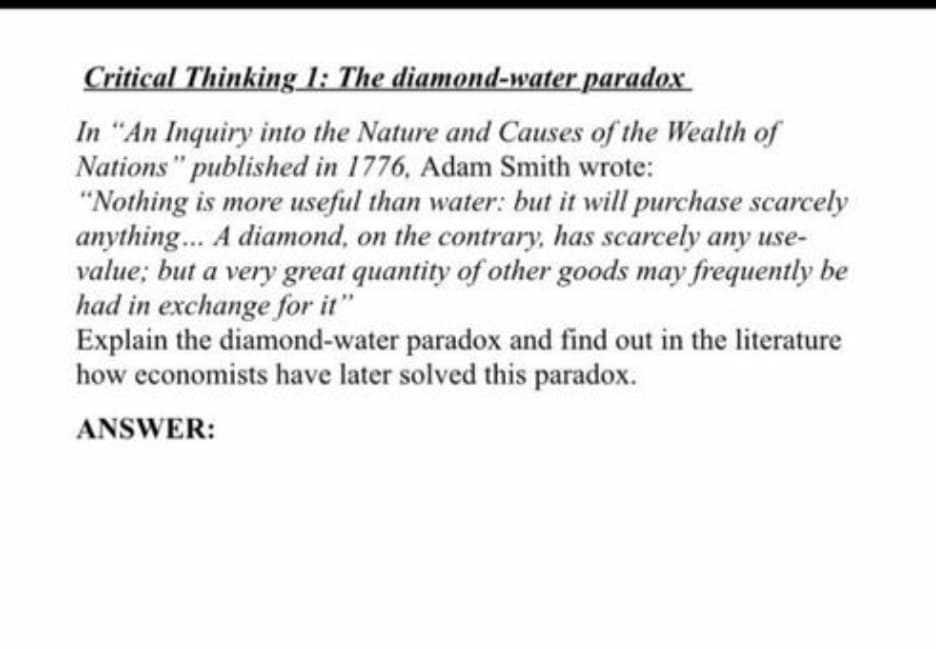Critical Thinking 1: The diamond-water paradox In "An Inquiry into the Nature and Causes of the Wealth of Nations" published in 1776, Adam Smith wrote: "Nothing is more useful than water: but it will purchase scarcely anything... A diamond, on the contrary, has scarcely any use- value; but a very great quantity of other goods may frequently be had in exchange for it" Explain the diamond-water paradox and find out in the literature how economists have later solved this paradox.
Critical Thinking 1: The diamond-water paradox In "An Inquiry into the Nature and Causes of the Wealth of Nations" published in 1776, Adam Smith wrote: "Nothing is more useful than water: but it will purchase scarcely anything... A diamond, on the contrary, has scarcely any use- value; but a very great quantity of other goods may frequently be had in exchange for it" Explain the diamond-water paradox and find out in the literature how economists have later solved this paradox.
Microeconomics: Principles & Policy
14th Edition
ISBN:9781337794992
Author:William J. Baumol, Alan S. Blinder, John L. Solow
Publisher:William J. Baumol, Alan S. Blinder, John L. Solow
Chapter18: Pricing The Factors Of Production
Section: Chapter Questions
Problem 4TY
Related questions
Question
100%

Transcribed Image Text:Critical Thinking 1: The diamond-water paradox
In "An Inquiry into the Nature and Causes of the Wealth of
Nations" published in 1776, Adam Smith wrote:
"Nothing is more useful than water: but it will purchase scarcely
anything... A diamond, on the contrary, has scarcely any use-
value; but a very great quantity of other goods may frequently be
had in exchange for it"
Explain the diamond-water paradox and find out in the literature
how economists have later solved this paradox.
Expert Solution
This question has been solved!
Explore an expertly crafted, step-by-step solution for a thorough understanding of key concepts.
This is a popular solution!
Trending now
This is a popular solution!
Step by step
Solved in 2 steps

Knowledge Booster
Learn more about
Need a deep-dive on the concept behind this application? Look no further. Learn more about this topic, economics and related others by exploring similar questions and additional content below.Recommended textbooks for you

Microeconomics: Principles & Policy
Economics
ISBN:
9781337794992
Author:
William J. Baumol, Alan S. Blinder, John L. Solow
Publisher:
Cengage Learning

Exploring Economics
Economics
ISBN:
9781544336329
Author:
Robert L. Sexton
Publisher:
SAGE Publications, Inc

Principles of Economics 2e
Economics
ISBN:
9781947172364
Author:
Steven A. Greenlaw; David Shapiro
Publisher:
OpenStax

Microeconomics: Principles & Policy
Economics
ISBN:
9781337794992
Author:
William J. Baumol, Alan S. Blinder, John L. Solow
Publisher:
Cengage Learning

Exploring Economics
Economics
ISBN:
9781544336329
Author:
Robert L. Sexton
Publisher:
SAGE Publications, Inc

Principles of Economics 2e
Economics
ISBN:
9781947172364
Author:
Steven A. Greenlaw; David Shapiro
Publisher:
OpenStax
